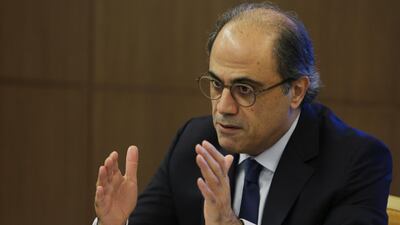In the wake of a slowing global economy, Middle Eastern countries need to press ahead with structural reforms, fiscal consolidation, diversifying their economies, boosting employment and harnessing the disruptive powers of technology, a senior International Monetary Fund official said.
"It's ever so more important to implement structural reforms … and there are a certain number of low-hanging fruits," Jihad Azour, IMF director of the Middle East and Central Asia department, said in an interview with The National. "It's important to pursue the consolidation that has started a few years ago and to anchor it into the medium-term fiscal framework. This is where the target should be."
The Washington-based lender is projecting global growth to slow to 3.3 per cent in 2019, from 3.6 per cent last year before rising up again to 3.6 per cent in 2020. Uncertainty over Brexit and trade tensions between the US and China, the world's two largest economies, have dented global economic output.
Within the broader Middle East, North Africa, Afghanistan and Pakistan region (Menap), overall gross domestic product (GDP) is projected to slow to 1.5 per cent this year from 1.8 per cent in 2018 before accelerating by 3.2 per cent next year, according to the IMF's regional economic outlook released on Monday.
Economies of oil-exporting Menap countries are expected to expand by 0.4 per cent this year with their non-oil GDP output rising 2.1 per cent. Their economies will accelerate by 2.8 per cent and non-oil GDP output will rise by 2.9 per cent in 2020.
Oil-importing economies are expected to slow to 3.6 per cent from 4.2 per cent last year and rebound to 4 per cent in 2020.
Oil exporters have pressed forward with economic diversification agendas in the wake of a three-year oil price slump that began in the middle of 2014. The implementation of VAT, reduction of the public wage bill and removal of subsidies on fuel and electricity sectors were "steps in the right direction," Mr Azour said.
While fiscal stimulus programmes to kick-start economic growth are good, oil exporters need to move forward gradually with an “instrument-driven financial inclusion policy” that addresses macro and sectoral issues as well as challenges facing companies, Mr Azour said.
"It’s an integrated framework that is needed here," he said.
These policy decisions will allow sovereigns to be more predictable in terms of their consolidation plans and will make them less dependent on the evolution of the price of oil.
“The path of diversification will help the economy to be less dependent on the fiscal stimulus,” said the IMF official, who previously served as Lebanon's finance minister. “For the GCC, it is still important to pursue fiscal adjustment by anchoring their fiscal policy into medium-term fiscal plans ... [that] will allow them to be less impacted by movement in oil price.”
Although the last five years have shown that the recovery from the oil price shock is slow, higher than average growth of the non-oil economy is positive, Mr Azour said.
In the long term, the region needs to “better understand how the fourth [industrial] revolution is going to shape up the global economy and what is the play a region like GCC could benefit from”, he added.
Access to finance in the Menap region, for small and medium-sized enterprises (SMEs), which account for more than 90 per cent of businesses, remains a big challenge. Credit to the private sector or SMEs, which employ 30 to 60 per cent of the population in different countries, does not exceed 6 per cent on average, which is one of the lowest in the world. Unemployment in the region also remains particularly high at 24 per cent among young people at the end of last year – close to 19 per cent in the female population, according to the IMF report.
“The region has not been able to address the problem of unemployment in the last ten years. We are talking the whole region [Mena],” he said. “Addressing those impediments will have a positive impact."
Increased competition among banks and reforms to strengthen legislative frameworks are key to credit growth being extended to the private sector. Increasing transparency and corporate governance, are also important, he said.
For the oil-importing nations such as Lebanon and Jordan, which are laden with public debt, maintaining untargeted and costly subsidies is not sustainable. Oil importers need to reform overall subsidy policies and build stronger safety nets that allow them to channel government support to those who need it most.
For “Lebanon and Jordan, reforming their electricity companies … is a priority,” he said. “Those companies are bleeding and affecting the macro-economic stability.” The solution is to have a comprehensive energy policy, gradually move to full removal of the subsidies and then redirect subsidies differently, targeted on poverty alleviation, he added.
The level of debt for oil importers is on average about 80 per cent of GDP or more, and has risen rapidly over the past decade. Countries such as Lebanon and Jordan have limited fiscal space and need to spend less on social protection, in comparison to other emerging market countries, Mr Azour said.
“This level of debt is unsustainable and needs to be addressed and the countries need to use wisely their fiscal tools,” he added.
The IMF director also called on international community to help Palestine with its fiscal woes as the economy teeters on the verge of collapse.
“There’s a need for the international community to help Palestine address its economic and financial challenges by allowing the economy to get access to resources,” Mr Azour said.

